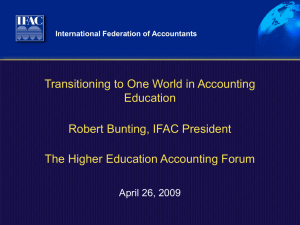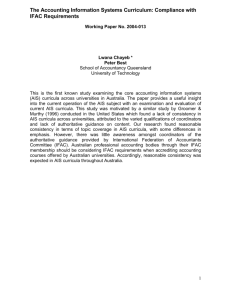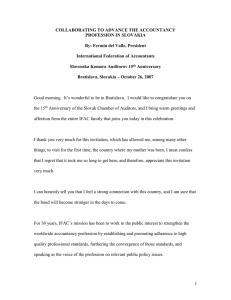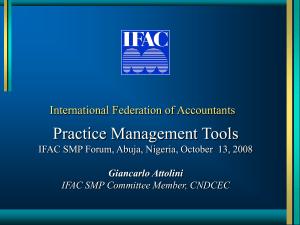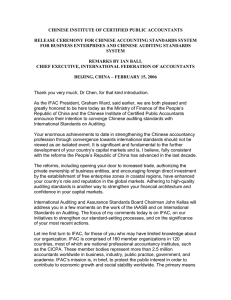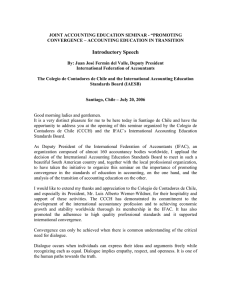SEEKING PROGRESS IN A TIME OF CRISIS The World Bank
advertisement
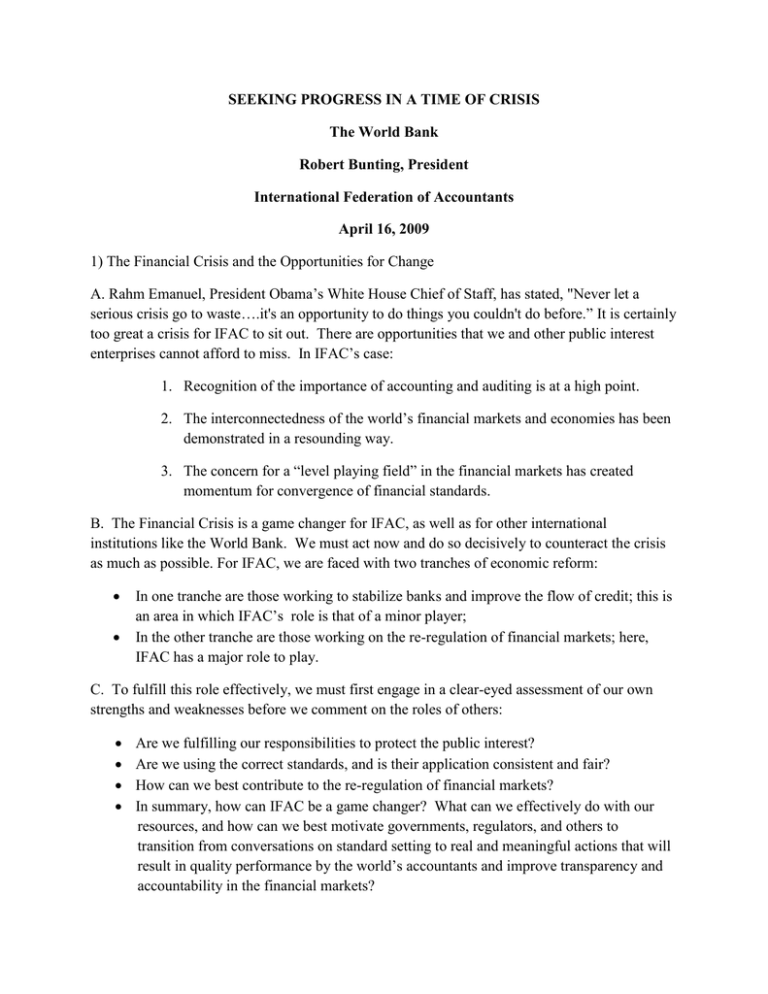
SEEKING PROGRESS IN A TIME OF CRISIS The World Bank Robert Bunting, President International Federation of Accountants April 16, 2009 1) The Financial Crisis and the Opportunities for Change A. Rahm Emanuel, President Obama’s White House Chief of Staff, has stated, "Never let a serious crisis go to waste….it's an opportunity to do things you couldn't do before.” It is certainly too great a crisis for IFAC to sit out. There are opportunities that we and other public interest enterprises cannot afford to miss. In IFAC’s case: 1. Recognition of the importance of accounting and auditing is at a high point. 2. The interconnectedness of the world’s financial markets and economies has been demonstrated in a resounding way. 3. The concern for a “level playing field” in the financial markets has created momentum for convergence of financial standards. B. The Financial Crisis is a game changer for IFAC, as well as for other international institutions like the World Bank. We must act now and do so decisively to counteract the crisis as much as possible. For IFAC, we are faced with two tranches of economic reform: In one tranche are those working to stabilize banks and improve the flow of credit; this is an area in which IFAC’s role is that of a minor player; In the other tranche are those working on the re-regulation of financial markets; here, IFAC has a major role to play. C. To fulfill this role effectively, we must first engage in a clear-eyed assessment of our own strengths and weaknesses before we comment on the roles of others: Are we fulfilling our responsibilities to protect the public interest? Are we using the correct standards, and is their application consistent and fair? How can we best contribute to the re-regulation of financial markets? In summary, how can IFAC be a game changer? What can we effectively do with our resources, and how can we best motivate governments, regulators, and others to transition from conversations on standard setting to real and meaningful actions that will result in quality performance by the world’s accountants and improve transparency and accountability in the financial markets? Can we use this crisis to gain greater support for our work in developing the auditing profession in less developed countries? 2) IFAC’s Role in the Global Financial System A. IFAC’s principal recognized role is to set high-quality standards in international auditing, education, ethics, and public sector accounting. B. Our less recognized role, and one that will be even more important in the years ahead, is our role as the facilitator and driver of adoption and high-quality implementation. This is where IFAC can help change the game—moving from the goal of convergence to implementation of standards. C. Before we can move to implementation, the world must agree on a single set of standards and stop using scarce resources debating whether there SHOULD be a single set of standards. D. If we can quickly agree on our destination, then our combined resources can be reallocated to getting there. This is one of the major game-changing opportunities available to IFAC, especially in wealthy regions like North America and Europe. E. If we achieve this goal, then the will and the resources to bring the rest of the world along will grow. 3) A Single Set of Standards A single set of high-quality global standards for auditing and ethics is necessary to support the global financial systems and create a level playing field around the world; regulators worldwide recognize this. Global standards benefit investors, public and private entities of all sizes, and the accountancy profession. Having a high-quality set of standards is meaningless unless they are thoroughly applied. Implementation of the standards is necessary if we are to achieve high-quality financial reporting and transparency. In times of crisis, such as now, implementation is urgent. IFAC, with 157 members in 122 countries and jurisdictions, has the capability and position to be a game changer in the current environment, moving the world from adoption to implementation. In addition to support from its member bodies of professional accountants, IFAC has the support of the Forum of Firms, an independent entity representing the major global auditing firms in requiring adherence to international standards, among other things. 4) IFAC’s Role in Implementation 2 A. Involvement of our member bodies, the Forum of Firms, members, and regulators empowers IFAC. IFAC has the mandate and authority under the shared system of regulation to promote implementation of the standards. Oversight adds credibility to the standard-setting process and by extension to IFAC’s role as driver and supporter of implementation. IFAC members support this model not only in spirit, but also in action due to our Statements of Membership Obligations and our member compliance activities. IFAC is in unique position to provide leadership on implementation issues by encouraging and facilitating collaboration among firms, practitioners, member bodies, regulators, and other stakeholders. B. IFAC has the power and position to influence the “game.” Member bodies are involved in promoting implementation through the Mentoring Program and other means. The Forum of Firms remains committed to global standards and the larger members include those standards in their procedures manuals, quality controls, and internal education programs. Statements of Membership Obligations make clear that national and other accountancy bodies must follow IFAC standards to the extent allowed by law, and to try and influence the adoption of international standards where they do not directly control the choice. The IFAC Compliance Program focuses on recommending the best means for IFAC members to implement standards. This program moves member bodies to action. Successful implementation depends on our ability to involve all of these entities and leverage their talents and resources efficiently and productively. C. IFAC has developed significant implementation support materials to help institutions and individuals move from adoption to implementation. IAASB video modules and slides on the Clarity Project (for July release) Developing Nations Tool Kit (translated into Spanish, French, and Russian) IAASB Practice Alerts PAIB Committee Guidance on Governance and other good practice documents ISA Guide on Implementation for SMEs Quality Control Guide for SMPs Financial Crisis Resources for SMPs 5) The Global Significance of SMEs and Micro-entities 3 Small and medium enterprises, as well as micro-entities, are incubators for growth in both developed and developing countries. In most countries, they account for 40-70% of private sector revenues and a similar percentage of employment. They create more new jobs than larger more mature companies, and they are far more innovative in bringing new products to market and creating entirely new markets, especially in consumer goods and technology. Many, if not most, of the newer capital market companies that are known for employment growth innovation and wealth creation began life as SMEs and, in a few cases, even micro-enterprises. Names such as Microsoft, Google, IKEA, The Virgin Group, Amazon.com, and many others come readily to mind. At a time when older generation enterprises in car manufacturing, air transportation, banking, and many other areas are shrinking or going out of existence, the world is increasingly dependent on SMEs for the next generations of innovation, employment growth, and prosperity. Yet, SMEs face unique challenges that are more acute in times of crisis: the ability to obtain capital and credit, the challenge to meet the rising costs of fuel, supplies, and other factors of production, and the ability to cost effectively meet regulatory and compliance requirements to name a few. New regulatory proposals need to consider the needs of all small businesses, including micro-entities, to ensure that unnecessary or unintended financial and other burdens are not placed on them. For example, consideration needs to be given to their capacity to meet new standards, as well as the appropriateness of these standards to this sector. World Bank and IFAC initiatives need to embrace these critical economic engines of growth and prosperity, called SMEs and micro-entities, even more closely by having a balanced approach to encouraging profitability, growth, and development on the one hand, and accountability and appropriate compliance to rules and regulations on the other. 6) How the World Bank and IFAC Can Work Together A. IFAC is committed to working with the World Bank and other institutions to deliver assistance efficiently where it can have the greatest impact. 1. While our largest resource allocation is to building and continuously updating highquality standards, we also spend significant resources on convincing regulators to adopt or converge to those standards and significant, but smaller, resources on assistance for implementation. 4 2. For IFAC, this crisis offers the opportunity to move beyond the question of whether countries should adopt global standards, and on to the important work of how the standards can be best implemented and how quality can be best monitored. 3. The G20 countries already agree that a level playing field (common standards and rules) is critical to the functioning of the global financial marketplace. They may not realize how important it is in the developing world, including its public institutions, small and medium enterprises, and even the important micro-entity sector. 4. IFAC has called on the G20 to support the World Bank’s ROSC initiative as a tool to assess markets and measure the future effectiveness of economic reforms resulting from the economic crisis. 5. IFAC and the World Bank must continue to build on their strong support of one another in two critical areas: a) Establish the appropriate professional infrastructures in developing and other countries, including encouraging the development of the right legal and regulatory mechanisms. This is a necessary pre-requisite for the implementation of standards. b) Secondly, we must continue to urge reforms of public sector financial management systems, encouraging increased government accountability and the adoption of accrual accounting where resources permit. World Bank support of IFAC initiatives has been invaluable. In light of the economic crisis and the IMF mandate, more emphasis will need to be placed on these areas in the future by both IFAC and the World Bank. 6. Having a high-quality accounting and auditing profession is a small but not unimportant part of every developing economy. It can be a bulwark against fraud and corruption, and it can be a significant resource to entrepreneurs, financial institutions, and public institutions. 7. The sooner we agree on a common global approach to these issues, the sooner we can accelerate the building process. B. By changing the game plan, we can help to achieve some of the common goals we have with the World Bank: building capacity, creating infrastructure, developing financial systems, and combating corruption. 5
